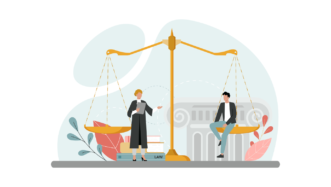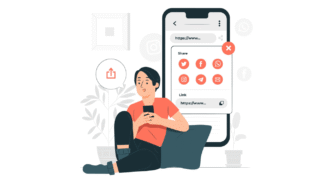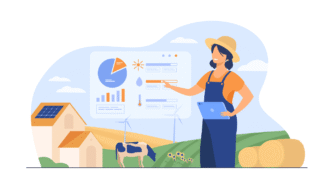LESSON OVERVIEW
In this lesson students practise the use of First Conditional, watch a video about grocery shopping and discuss how we can waste less.
WARM-UP AND VIDEO
The lesson starts with a brainstorming activity in which students decide what nouns collocate with the verb waste and what the examples of those are (e.g. waste money, petrol, paper). Before watching the video, students read four comments posted under it and decide what the video might be about. During the first viewing, students choose which of the six points are the purpose of the video (e.g. to recommend cycling, to show a quicker way to shop for groceries). They need to explain their answers. During the second viewing, students list five facts about grocery shopping in the Netherlands and North America based on the information from the video. The video activities are followed by a discussion about students’ grocery shopping habits. Finally, students read five First Conditional statements and decide if they agree with them. The statements refer to grocery shopping (e.g. You will eat a lot of fresh food if you buy groceries more often.).
FIRST CONDITIONAL AND DISCUSSION
In this part of the lesson students do some grammar work. They complete the rules of forming First Conditional sentences using the statements from the previous exercise as a guide. Then, they do a gap filling activity and have to put verbs in correct forms to create conditions and results. They choose if they want to use affirmative and negative forms to make the sentences logical. After that, they complete a set of New Year’s resolutions using First Conditional. All resolutions have to do with wasting less (food, water, time, etc.). Finally, students play a game. Each person in a pair gets a list of phrases. The first student chooses a phrase (e.g. save electricity) and starts a First Conditional sentence. Their partner finishes the sentence using a phrase from their list (e.g. turn off the light) and adding any necessary information to make the sentence logical. The task can be done with the teacher in a one-to-one lesson.
WORKSHEETS
Subscribe to unlock these and many other Standalone lesson with the Premium plan
Subscribe











I was just wondering where would I get my next B1 level lesson from! 😀 This material already at a glance looks great and well-balanced. There seems to be plenty of speaking practice in it mixed with an important grammar point + an interesting video as an added bonus 🙂
Thank you ESL Brains for making my life and work a lot easier and more entertaining and for the great job that you do!!
Thanks, Bea! Much appreciated! Enjoy 🙂
You guys do an amazing job with all the lessons. Such a great help for teaching. Thank you
Thanks, Sasha 🙂
Great stuff! I’ll be using it with some of my students. Cheers! filipe
Thanks, Filipe. I hope they like it!
Hi! Excellent lesson plan! Congrats! Thanks for sharing!
Glad to hear that! Thanks 🙂
I love this lesson! The mind map at the beginning was a hit for my students and very helpful! I would love more lessons with mind maps or things like that in them. This was great, one of my favorites!
Thanks, Sam! We love mind maps, too, so there are already quite a few lessons that include them. And there will be more for sure 🙂
What age group is this aimed at? Could 12 year old students manage it?
Hi, Julian! All ESL Brains lessons are aimed at adults. We leave it up to the teachers to decide whether a lesson is suitable for their younger students.
With this one, I’d say that it might not be that interesting for a twelve-year-old. The lesson deals with topics like shopping for food, saving money, food waste, New Year’s resolutions, and I’m not sure how many twelve-year-olds have experience with all that… But, as I said, you might decide the lesson is appropriate for your students. After all, you’re the one who knows them best.
Hi,
I like this one too. However, I feel like Ex 10 could be a little confusing for students. I can’t seem to find the link between the example given and the list of phrases.
Hi Mike! Exercise 10 is just a prompt to create First Conditional sentences. They don’t need to be connected to the example in any way. The point is to use First Conditional structure to create standalone sentences, and to explain how the condition and the result are linked. So student A might start and say ‘I will be late for work if…’ and student B might say ‘…I call you this evening. I will stay up late and I won’t get enough sleep’.
Hope this helps 🙂
Appreciate it Ewa! That helps.
Sorry to bother you, but I was wondering about the grammar rule box.
I try to help my students remember that we NEVER use will or would on the “if”, or conditional side of the sentence.
I cannot find any examples of that construction in the text, either.
Would it possibly be better to omit the will in the rules box to avoid confusion?
Have a great day, and please keep up the good work!
Best,
Christine
Hi, thanks for the comment 🙂 I think you are referring to the task in which students need to cross out ‘will’ after ‘if’. The ‘will’ is just an option for students to choose from (an incorrect one). The point of the task is to help them remember not to use ‘will’ after ‘if’.
ive been a big fan of your work!!! Keeps getting better! Thank you!! Vanessa (France)
Thanks, Vanessa 🙂 🙂
I’m not satisfied with all these lessons. Every lesson you must watch a video and I think it is just cheap. I don’t want to say anything else because I have nothing nice to say.
Hello, I am curious regarding “unless” and a negative from. There is one example in your document: “I won’t throw away things I don’t need unless they can’t be fixed.”
I looked at various debates and some people suggest that it is possible to use a negative from with unless whereas formal websites indicated that we can’t have double negatives. I am really wondering what is right.
Hi Lenka! I’d say a double negative is when the verb and a modifier are negative, e.g. I don’t know nothing about it. The sentence from the lesson does use more than one negative, but there are two different verbs. Another example in a conditional sentence would be: I won’t be able to help if you don’t ask.
Hi, thank you for your response. I am a bit confused regarding “unless” followed by a negative verb. I have been reading some material and some people say “unless” can be followed by a negative, e.g. “My uncle can help us UNLESS he doesn’t get off work soon enough.” In the exercise above I’ve noticed “I won’t throw away things I don’t need unless they can’t be fixed.” Somebody was arguing with me that after “unless” we can’t have a negative form.
Using a negative form after ‘unless’ might add to the cognitive load of understanding the sentence but I don’t think there is a rule that forbids it.
Thank you so much for your replies. Kind regards
Sure, no problem 🙂